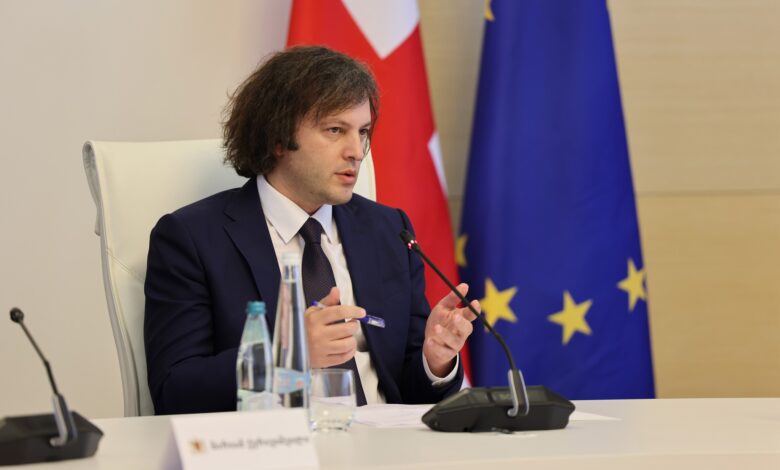
Kobakhidze Downplays Concerns Over EU Visa-Free Suspension as Mere Fear of “Visa Lines”
Georgian Dream Prime Minister Irakli Kobakhidze downplayed concerns about the potential suspension of the EU’s visa-free regime with Georgia, saying that it would only mean people queuing at embassies for visas again, while claiming that the majority of the population cares about “real national priorities.”
He further claimed that, economically, visa-free travel encourages migration, which he described as a downside of the privilege Georgians have enjoyed since 2017.
“There is a part of the population for whom not having to stand in visa lines is the highest value and the highest priority,” Kobakhidze said on a late-night interview with pro-government Rustavi 2, when asked about possible public reaction if the EU suspends the visa-free regime. He said that only these people, whom he insisted “cannot be the majority,” would take to the streets in protest.
“But the majority of the population has other priorities – they know very well what the real national priorities are,” Kobakhidze added. “These are preserving peace, maintaining stability, preserving values, developing the economy, and so on.” Kobakhidze said the “vast majority” of Georgians will stand for “peace” and “stability,” which Georgian Dream members often contrast with the visa-free regime.
Georgia has until the end of August to address the European Commission’s eight recommendations, as the bloc of 27 warns of suspending visa-free travel — a “key milestone” in EU-Georgia relations since its introduction in 2017, which the Commission said has delivered “tangible benefits” to Georgians. Among the recommendations is the repeal of legislation cracking down on civil society and LGBT rights, a step the ruling government appears unwilling to fulfill.
“This process is extremely unfair towards the Georgian people,” Kobakhidze said in the same July 21 interview, expressing hope that the “European bureaucracy” will not suspend visa-free travel with Georgia, a step he described as “completely non-productive” and “counterproductive” for the EU itself.
He added that the EU, which he compared to the USSR in the 1990s, has become “very unpredictable,” once again expressing hope that the bloc will make a “pragmatic” decision to maintain the visa-free regime for Georgia.
“There is no connection between visa liberalization and economic growth,” Kobakhidze claimed in the interview. “It’s only about one thing: whether you have to stand in line for a visa or not,” he added.
Economically, Kobakhidze said the downside of the visa-free regime is that it “encourages migration.”
“In the absence of visa liberalization, many more of our citizens would remain in the country, which would correspondingly lead to a growth in the workforce. This would, of course, further contribute to faster economic development,” he argued.
Unlike most EU foreign policy decisions, suspending visa-free travel does not require unanimity among all 27 member states. Instead, a qualified majority, at least 15 out of 27, with 65% of the population, can approve the move.
The EU has already suspended visa-free travel for diplomatic travel holders. In June, Kobakhidze admitted he had to use a visa to travel to one of the European countries, but did not specify which country.
Observers have noted that visa-free travel has been one of Georgia’s key achievements, with its benefits extending far beyond tourism, boosting economic and labor exchange, improving access to healthcare for Georgians, and strengthening ties among families separated by economic migration. 42 Georgian CSOs said in a July 16 statement that the full responsibility for possible visa suspension “lies with the [Bidzina] Ivanishvili government.”
Also Read:
- 21/07/2025 – Georgian Patriarchate Slams EU’s Call to Repeal Anti-LGBT Law
- 18/07/2025 – Kobakhidze Says ‘Global War Party’ Uses EU Visa Threat to Open Second Front in Georgia
- 17/07/2025 – Kobakhidze Says Visa-Free Travel “Not Existential” as Brussels Warns of Suspension